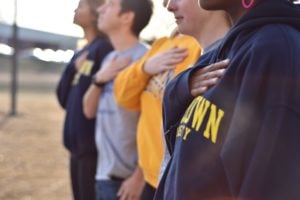![]()

KARLA CONDADO/The
ThreefoldAdvocate
John Brown University students stand for the national anthem amid controversy regarding both professional and student athletes kneeling for the national anthem.
In 2016, the nation protested against racism. In late August, a San Francisco 49ers football player decided to take a stand by kneeling when the national anthem was played.
The NFL quarterback, Colin Kaepernick, said he doesn’t agree with how the country does not support black rights. With the recent shootings of unarmed black men, he felt the need to protest in order to start the conversation about racism.
The protest has gone on all football season and has trended with several other teams across the country. This growing trend was brought to the John Brown University athletic department’s attention and coaches were encouraged to talk about it. This month, JBU athletics held an event to show the school’s stance on the matter.
John Brown organized a panel of five people to discuss the kneeling controversy including President Chip Pollard, Athletic Director Robyn Daugherty, Trisha Posey, Director of Honors Scholars Program and Associate Professor of History, Alicia Watt and Sarah Abbott, a recently graduated JBU women’s soccer player. The forum opened with an explanation of the kneeling protest controversy by President Pollard. After the explanation, Posey gave a brief history of protesting in sports.
Watt then explained why she was in favor of the kneeling protests. After six players for the University of Arkansas women’s basketball team kneeled during the national anthem to protest, Watt decided to attend a basketball game to support the team in their protest. Surprisingly, she didn’t see the players kneeling when she attended the game. The team was told by the school not to kneel at that game or there would be consequences.
Abbott also spoke about her feelings towards the protests. She explained how she considered kneeling at a JBU soccer game in the fall season. After consulting her coaches, she decided not to kneel when the national anthem was played.
Athletic Director Robyn Daugherty gave the final word. She explained her belief that protesting should not be allowed in the sports program. She went on to say she didn’t think JBU Athletics should allow their athletes to kneel during the playing of the national anthem.
There were many JBU students who attended the forum.
“I was disappointed in not talking about military and respecting our ideals of freedom,” business major Matt Logan said in response to the forum. “There have been people who protested racism appropriately, but not on a sports platform.”
Philip Todd, a business major and tennis athlete commented,
“I really had no problem with protesting on a sports platform,” business major and tennis athlete Philip Todd said. “For me, it was more of protesting the national anthem that was distasteful for me. I think protests should not disrespect the people who have fought and died for the right to protest, which I believe protesting the national anthem is. If an athlete really wants to protest ‘American Oppression,’ refuse to take a salary. It seems a bit hypocritical to me to be protesting inequality in America when they are in the top one percent of not only the nation, but the world, due to their position as a professional athlete.”
JBU Athletics will continue to prohibit the kneeling protest during the national anthem, but has also decided to address the bigger issue of racism among the student body.




